police brutality
1. Masculinity Gets Modern Makeover in Latest Getty Images Collection
Tired of seeing stock images that reinforce traditional gender roles? Getty Images is (finally) changing that with the help of Sheryl Sandberg's LeanIn.org.
2. The Human Right to Have a Home
As Congress plans to slash funding for housing assistance programs, Catholic bishops in the U.S. are protesting, arguing "housing is a human right."
3. WATCH: ‘What Are You?’ — Multiracial in America
Listen to how multiracial Americans react when they're asked "What are you?" (Hint: I's usually not well).
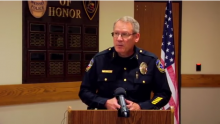
McKinney, Texas police officer Eric Casebolt — whose recorded response to a disturbance call at a community pool party on Friday went viral, sparking national outrage about the force used against black teens — resigned from the police force on Tuesday. Police Chief Greg Conley said Tuesday evening that Casebolt was “out of control” and his actions were “indefensible.”
“He came into the call out of control and as the video shows was out of control during the incident,” Conley said, adding, “I had 12 officers on scene and 11 of them performed according to their training. They did an excellent job.”
From local ABC News affiliate WFAA in Dallas:
The 10-year veteran of the McKinney Police Department was placed on administrative leave Sunday after a 7-minute video of the incident at a Craig Ranch community pool gained traction on the Internet. That clip has now been viewed almost 9.5 million times.
The footage shows Cpl. Casebolt, who is white, aggressively responding to the disturbance call, using profane language with black teenagers, unholstering his service weapon and pointing it toward the unarmed teens, and restraining a 15-year-old girl in a swimsuit by forcing her to the ground and placing his knee on her back.
View the original video of the incident below.

After a video of white police officers arresting black teenagers with excessive force went viral over the weekend, the police department in McKinney, Texas, has opened a formal investigation into the incident, placing one officer on administrative leave.
The officers were responding to residents who complained about unwelcome teenagers causing a disturbance at a private community pool in the affluent Craig Ranch subdivision of McKinney, Texas.
In the video, Police Corporal Eric Casebolt is seen pushing a bikini-clad 14-year-old girl to the ground, before jamming her face down and sitting on top of her. When two boys jump up to confront the officer, he pulls out his firearm and points it at the teens.
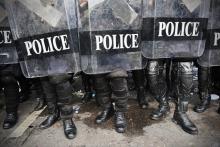
The White House released a statement today outlining restrictions on the federal government’s distribution of weapons, vehicles, and other equipment to police departments.
Newly prohibited equipment includes bayonets, grenade launchers, firearms of .50 caliber or higher, weaponized vehicles, and “vehicles that … utilize a tracked system instead of wheels for forward motion” (i.e. tanks).


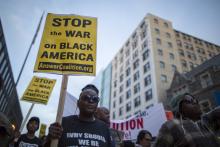
Hundreds gathered at Gallery Place Metro in Washington, D.C., on Wednesday night in solidarity with Baltimore activists to protest the death of Freddie Gray. The crowd marched for two hours across the city until reaching their final destination at the White House.
Leaders from multiple activist groups were helping lead the crowd, including Eugene Puryear, a candidate for the At-Large seat in the D.C. Council. The crowd began the march with chants of, "All night, all day, we're going to fight for Freddie Gray!" More solidarity events have been planned by the event organizers in the upcoming days.

I walked through ash and glass as neighbors and community members swept up the remnants of our neighborhood. The night before, flames touched sky in all corners of our city as news and police helicopters hovered overhead. The city was Los Angeles. The year was 1992, and it was the third day after the police who beat Rodney King were acquitted by an overwhelmingly white jury in Simi Valley.
That was the day I was introduced to the words of Jeremiah 29:7: “But seek the peace of the city where I have sent you into exile, and pray to the Lord on its behalf, for in its peace you will find your peace.”
On Monday, Maryland Gov. Larry Hogan called in the National Guard and Baltimore Mayor Stephanie Rawlings-Blake declared a citywide curfew to quell violence that erupted in Monument City following the funeral of 25-year-old Freddie Gray. Gray died a week after sustaining a nearly severed spinal cord after being detained by police on April 12. The reason for the stop? Gray ran after making eye contact with police. An investigation is ongoing — while the people of Baltimore and beyond demand justice.
The images of fires rising over the Baltimore landscape were eerie, as it was only a few months ago that the nation sat glued to television sets watching the small town of Ferguson, Mo., erupt. And I fear we are becoming numb to it. We turn the TV on to watch our favorite reality show. We see chanting, running black people, and we think: again? Then we turn back to The Voice.


If it is simply a matter of forgiving, perhaps better stated as reconciliation, that still leaves the question of the kind of “just world” people are trying to develop—or ought to develop.
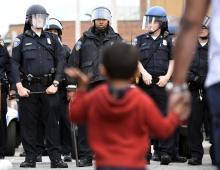
I enjoy cop shows on television.
My favorite is Blue Bloods, following the “Reagan” family from terrorist threats to homicides to domestic violence.
I can’t imagine what it’s like to be a cop. Perhaps routine marked by bursts of frenzy, some of it life-threatening. One’s hometown seen through the lens of crime, tragedy, and evil. Low pay, high risk.
I like Blue Bloods because it shows upright law enforcement taking “Protect and Serve” seriously and making brave and ethical choices.
These shows are quite unrealistic, of course. Crime doesn’t get solved that easily or snap decisions made that wisely.
I don’t think, however, that I realized until recently how separated from reality those fictional accounts have been. As police shootings of unarmed citizens go viral, as minorities talk of long-standing police brutality, as we watch guards beating prisoners, and as federal law enforcement engages in creepy surveillance, internal corruption, and the arming of local police as military commandos, the veil is lifted.
Now we see in our own American law enforcement the same brutality and power-madness that have marked corrupt societies we supposedly surpassed, from the secret police in Eastern Europe to uniformed thugs in South America.
I find it confusing. Not the discovery that TV isn’t real, but to see how low we have fallen. Has this brutality been the dark side of police work all along?
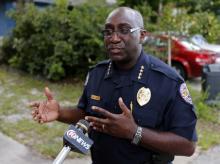
Christian ministers should establish relationships with law enforcement, seek ways to become moral authorities in their communities, and listen.
Those were the top recommendations from experts at a panel sponsored by The Gospel Coalition on April 14 titled “Seeking Justice and Mercy From Ferguson to New York.”
The popular ministry offered an alternative approach to that of evangelist Franklin Graham, who was widely criticized for his recent “Obey the police, or else” comments on Facebook. The comments followed the spate of police killings of unarmed black men.
In response to that Facebook post, 31 African-American, Hispanic and Asian-American leaders, many of them evangelicals, signed an open letter to Graham, saying he revealed a lack of empathy and understanding of the justice system.
At the April 14 panel, pastor and former public defender Ed Copeland; music producer and Filipino film and TV actor Alex Medina; Sanford, Fla., Police Chief Cecil Smith; and U.S. Attorney Robert Lang offered tips to help ministers and other church leaders become “ministers of reconciliation.”







